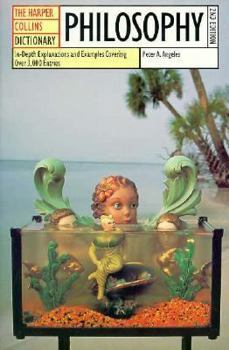HarperCollins Dictionary of Philosophy, 2nd Edition: In-Depth Explanations and Examples Covering More Than 3,000 Entries
Select Format
Select Condition 
Book Overview
The HarperCollins Dictionary of Philosphy provides a single source of clear and understandable definitions of philosophic terms. Emphasis is on the areas most commonly covered in introductory philosophy courses: epistemology, metaphysics, logic, ethics, aesthetics, and the philosphies of religion and politics.
Format:Paperback
Language:English
ISBN:0064610268
ISBN13:9780064610261
Release Date:August 1992
Publisher:Collins Reference
Length:352 Pages
Weight:0.62 lbs.
Dimensions:0.9" x 5.3" x 8.0"
Customer Reviews
5 ratings
Praise from a Philosophical Hack
Published by Thriftbooks.com User , 16 years ago
I enjoy studying philosophy, but have never studied it formally. As such, there are numerous ideas, terms, figures, and movements that I am not that familiar with. So, when I come across them I need a quick definition, that is down to earth, and solidifies the discussion in a few short sentences, so I can have a greater understanding of the issues and the author that I am reading. This dictionary accomplishes that task. So, for example, I was studying primary and secondary qualities in a work and the author's wording was a bit confusing. I grabbed this dictionary, looked up "Qualities" and it provided a concise, cogent definition, which enabled me to understand the author's arguments better. If you have found yourself in this position before, are new to philosophy, or just looking for a good, solid philosophical dictionary, then this is a great source.
At times it could be clearer...
Published by Thriftbooks.com User , 17 years ago
One thing about ancient philosophy and ancient Greek... it tends not to change a lot with time. Some of the terms in philosophy are unique to the field and other dictionaries or encyclopedias lack the depth or understanding to present them right. This dictionary may not be as current as one would like, but it answered a number of my question when I needed it. It will be helpful to anyone study the history of philosophy.
My girlfriend likes it...
Published by Thriftbooks.com User , 17 years ago
I bought this book as a Christmas present for my girlfriend (a philosophy student). I don't know anything about the subject, but she carries this book around with her everywhere, and is constantly looking things up in it, so I guess that means it's pretty good! =)
Very useful
Published by Thriftbooks.com User , 19 years ago
I got this dictionary as one of my first purchases during my undergraduate days 25 years ago, and have never regretted the acquisition. This is a dictionary, not an encyclopedic dictionary or collection of short essays, but really is a dictionary of terms and quick concepts. While some might be aghast at the idea that philosophy could be reduced to a simple set of definitions, let me state that this is not what I am saying (or what Peter Angeles does). However, many was the time I would be reading a text in philosophy where ideas and terms would pop up that were unfamiliar to me - if I used the four-volume Encyclopedia of Philosophy on my shelf, I'd sometimes end up with too much information (or, as often as not, too much of a diversion). Angeles' text is quick and useful for finding quick ideas to continue the reading uninterrupted. This is meant for the beginner in philosophy - it covers terms and concepts in key areas such as metaphysics, ethics, epistemology, aesthetics, logic, religion and politics. These are the primary areas of concern for basic philosophy students. This is a dictionary of concepts and terms, not everything in philosophy. For example, this book does not include biographies or historical timelines, chronologies or discussion of that sort. There is no entry for Immanuel Kant; there is no entry for The Enlightenment. These would items ill served by a brief one-paragraph definition. On the other hand, under the listings of 'logic', there are twelve entries, and nine cross-references (lest one think that a term like logic would be disposed on within one paragraph). Major philosophers are mentioned in connection with the concepts and formulations that they have developed (or argued against), and there is a useful index of philosophers in the back of the book keyed to the dictionary entries in which they are found. During my undergraduate days, this was one of the most useful books on my shelves. It is testimony to that usefulness that 25 years later, in paperback form, it still retains a place of pride (and easy reach!) on my shelf.
Excellent, compact and to the point.
Published by Thriftbooks.com User , 25 years ago
This dictionary was recommended to me for my philosophy courses. I was rewarded by its usefullness and concise, direct definitions. I found it a valuable asset to my core philosophy courses and will certainly keep it on my shelf for further reference.





